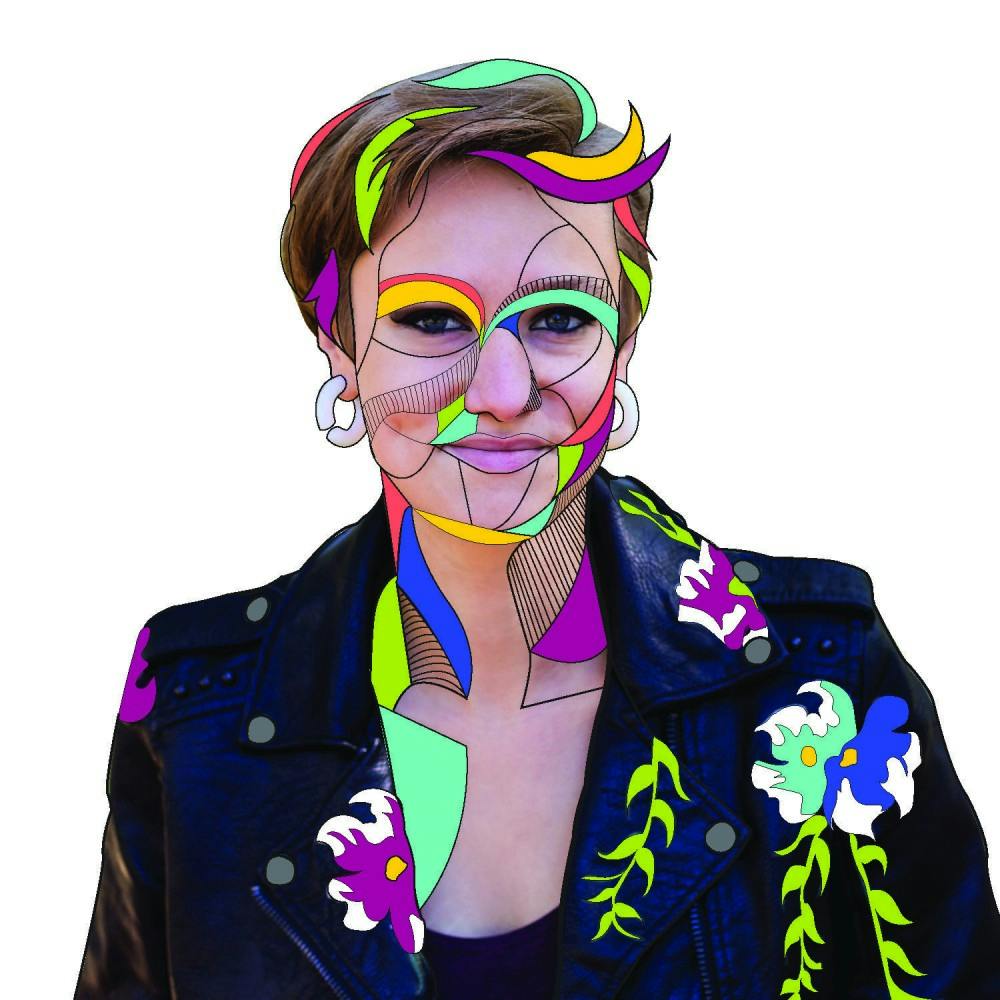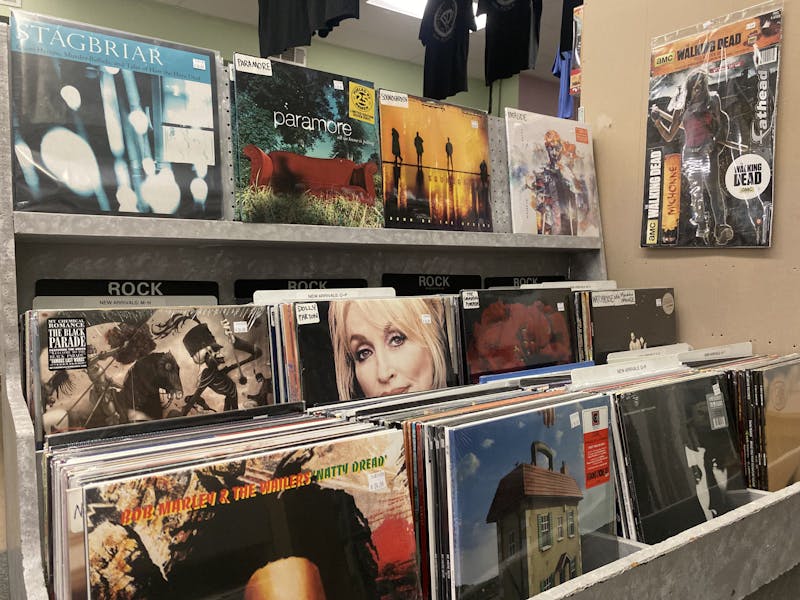Like many other sexually frustrated and emotionally unstable high schoolers, I was unable to truly come to terms with my sexuality until college. I went to school in an exceptionally rural and conservative part of South Carolina. The majority of students were white, heterosexual, upper-middle class individuals. I joined the Gay-Straight Alliance my freshman year, where I found a niche group of people that I could identify with. I remained in the club throughout high school, until I eventually became a co-president of the organization my senior year, despite my closeted sexuality.
Upon arriving at university, I was forced to actually think about my identity. I felt uncomfortable with labels, but I desperately wanted to feel like I was part of a larger community. I attended IRIS meetings but felt like I was somehow lying to my colleagues, so I didn’t return after the first few weeks.
Toward the tail end of my first year in college I became more comfortable with the idea of identifying as bisexual. Despite this less than revelatory experience, I still was reluctant to formally come out.
My validation as a bisexual was solely dependent on external factors. I typically present myself as what is societally considered to be feminine, and at the time I was dating a man. Who was I to think that it was acceptable to come out under these circumstances? Even while writing this story I felt a strong urge to prove my status as a member of the queer community. I found myself often mentioning my girlfriend while conducting interviews with other queer people as a way of verifying my bisexual status.
My experience is not necessarily a unique one. Despite a recent social shift toward acceptance of the LGBTQ community, harmful stereotypes still plague many of the underrepresented groups. Bisexuality is commonly referred to as a stepping-stone for other identities. If a man identifies as bisexual, he’s actually gay. If a woman identifies as bisexual, she’s straight. If she happens to come out in college, she is obviously just experimenting. I’ve heard it all. Bisexuals are confused, greedy, promiscuous and incapable of commitment to any gender. These stereotypes, as presented in popular media and mainstream culture, are increasingly damaging — especially during pivotal years as a college student.
Higher education is typically presented as a time of identity and self-realization. For many students, it is the first available opportunity to express themselves within a queer community; and it is the first time they may feel safe enough to address their sexuality openly and organically.
Ed Madden is the poet laureate of Columbia, a social activist and the director of Women’s and Gender Studies department at USC. I met with Madden to discuss the issues that he faced as a gay man growing up in the South and the issues that queer students still face today. He grew up in a rural town in Arkansas and attended a fundamentalist Christian college. At this school, there were no resources for queer students. Madden recalled a colleague that was outed by a roommate her senior year. She was given the option of participating in mandatory ex-gay counseling or being kicked out.
Madden noted that when he first came to Columbia in 1994, the queer student group consisted mostly of juniors, seniors and graduate students. He observed that today, members of the club are typically first- and second-year undergraduates. This demographic shift suggested to Madden that students are coming out earlier and becoming more self-aware at an earlier age. Although going to school in a larger city has the benefit of more LGBTQ resources, Madden noted that there is still progress that needs to be made.
“There’s still a need for support structures,” Madden says. “I think there’s a real need now for greater awareness of the range of sexual identities, like trans, asexual, and bisexual, and greater awareness for intersectionality in ways that I don’t think there were when I first came here.”
Miles Joyner is the logistics director of the university’s LGBTQ organization, Individuals Representing Identities and Sexualities. Joyner, who prefers the pronouns they/them, is one of the most effortlessly badass people I have ever encountered. We met outside on a warm autumn day. I was unfortunate enough to have caught the seasonal sinus infection that tends to circulate campus during the first few weeks of fall, and I felt groggy and lethargic. I was excited to meet Joyner, but I was honestly just ready to go home and crawl into bed à la a Nyquil-induced slumber at 6 p.m. Joyner shows up to the interview wearing a bold plum lipstick, sturdy biker books and pink, reflective cat eye sunglasses — a look they pulled off with ease and confidence.

What I expected to be a brief interview launched into an hour of conversation about coming out, monosexism and bisexual representation on campus. We discussed Joyner’s popular blog, “Earning Mileage,” and how it is used as platforms to spread information and awareness about bi topics. Joyner has previously spoken on panels for Transgender Day of Visibility and the Deckle Edge Literary Festival. After coming out as bi in high school at 17, Joyner didn’t feel the need to come out again in college.
“I’m so out in every aspect of my life that at this point, me telling you would just be ruining the surprise,” Joyner says.
While Joyner has found a community within USC and mentioned the progress that has been made thus far, they still emphasized the importance of bi-specific resources and spaces.
“I experience more privilege being in Lexington and Columbia than I would if I was in the heart of Mississippi … but, I mean, it took until last year for there to stop being more than 50 protesters at Pride. So there is still that aspect of it. I mean, I’m out to everybody that I work with. I don’t live in fear on a daily basis about coming out. But I do still have to absorb the extent of homophobia in this region,” they said.
Acts of both biphobia and bi-erasure are still alarmingly frequent, even on university campuses. Bi-erasure is loosely defined as when the existence or legitimacy of bisexuality is questioned or denied.
“It’s definitely hard to put a regional dot on biphobia or bi-erasure because they are still such common things that I wouldn’t necessary plant them in one region. But because it’s the South, there’s definitely fewer resources here to kind of educate against it,” Joyner says.
Although Joyner hosts a Bi+ space and a Bi101 educational workshop monthly at the Harriet Hancock Center, there is still a sense of disconnect between bi+ identifying individuals and other members of the queer community.
IRIS development director Drew Hill came out to her friends and family in middle school and was met with mixed responses.
“I feel like when you say you’re bi, people don’t necessarily know what to do with that information because they can’t put you in a box,” Hill says. “People didn’t really know how to receive what I was saying, either by lack of understanding or by lack of acceptance.”
She noted that in previous years, some bi individuals didn’t return to IRIS meetings out of fear of alienation and lack of inclusivity.
“I feel like we’ve been trying to be more accepting of all of the identities, because I know before I felt like it was very much L and G were the only letters that were important,” she says.
The group has since made strides to be more inclusive by addressing these issues and hosting meetings specific to other sexualities and gender identities.
A major problem that LGBTQ college students still face is a lack of diversity and visibility in leadership positions within the university. This includes higher-level positions like the Board of Directors but also applies more directly to Student Government and other clubs and organizations. Most LGBTQ students in leadership positions on campus are typically involved with the Office of Multicultural Student Affairs or IRIS. Although these positions within LGBTQ groups on campus can be beneficial, the unfortunate reality is that change is often made through positions outside of the queer community.
Representation matters. It matters that bisexuality is accurately and fairly depicted in the media, pop culture and within queer communities. It matters that some bisexuals don’t feel comfortable addressing their identity even within safe spaces. It matters that these issues are addressed now — not because they should be, but because they need to be.



